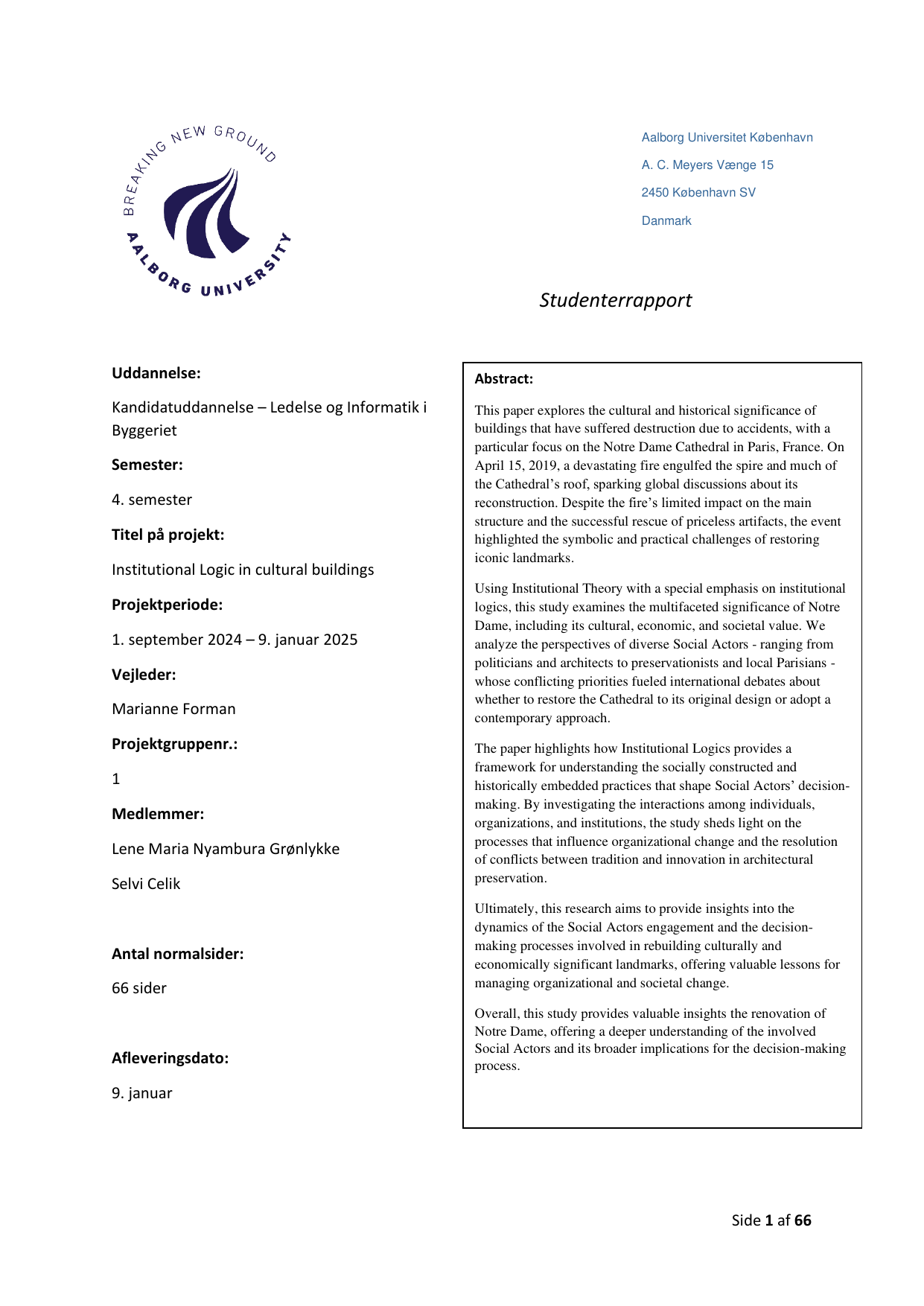
Institutional Logic in Cultural Buildings: A case study of how the conflicts that arose in the reconstruction of the Notre Dame Cathedral
Authors
Term
4. term
Publication year
2025
Submitted on
2025-01-08
Pages
66
Abstract
This paper explores the cultural and historical significance of buildings that have suffered destruction due to accidents, with a particular focus on the Notre Dame Cathedral in Paris, France. On April 15, 2019, a devastating fire engulfed the spire and much of the Cathedral’s roof, sparking global discussions about its reconstruction. Despite the fire’s limited impact on the main structure and the successful rescue of priceless artifacts, the event highlighted the symbolic and practical challenges of restoring iconic landmarks. Using Institutional Theory with a special emphasis on institutional logics, this study examines the multifaceted significance of Notre Dame, including its cultural, economic, and societal value. We analyze the perspectives of diverse Social Actors - ranging from politicians and architects to preservationists and local Parisians - whose conflicting priorities fueled international debates about whether to restore the Cathedral to its original design or adopt a contemporary approach. The paper highlights how Institutional Logics provides a framework for understanding the socially constructed and historically embedded practices that shape Social Actors’ decision-making. By investigating the interactions among individuals, organizations, and institutions, the study sheds light on the processes that influence organizational change and the resolution of conflicts between tradition and innovation in architectural preservation. Ultimately, this research aims to provide insights into the dynamics of the Social Actors engagement and the decision-making processes involved in rebuilding culturally and economically significant landmarks, offering valuable lessons for managing organizational and societal change. Overall, this study provides valuable insights the renovation of Notre Dame, offering a deeper understanding of the involved Social Actors and its broader implications for the decision-making process.
This paper explores the cultural and historical significance of buildings that have suffered destruction due to accidents, with a particular focus on the Notre Dame Cathedral in Paris, France. On April 15, 2019, a devastating fire engulfed the spire and much of the Cathedral’s roof, sparking global discussions about its reconstruction. Despite the fire’s limited impact on the main structure and the successful rescue of priceless artifacts, the event highlighted the symbolic and practical challenges of restoring iconic landmarks. Using Institutional Theory with a special emphasis on institutional logics, this study examines the multifaceted significance of Notre Dame, including its cultural, economic, and societal value. We analyze the perspectives of diverse Social Actors - ranging from politicians and architects to preservationists and local Parisians - whose conflicting priorities fueled international debates about whether to restore the Cathedral to its original design or adopt a contemporary approach. The paper highlights how Institutional Logics provides a framework for understanding the socially constructed and historically embedded practices that shape Social Actors’ decision-making. By investigating the interactions among individuals, organizations, and institutions, the study sheds light on the processes that influence organizational change and the resolution of conflicts between tradition and innovation in architectural preservation. Ultimately, this research aims to provide insights into the dynamics of the Social Actors engagement and the decision-making processes involved in rebuilding culturally and economically significant landmarks, offering valuable lessons for managing organizational and societal change. Overall, this study provides valuable insights the renovation of Notre Dame, offering a deeper understanding of the involved Social Actors and its broader implications for the decision-making process.
Keywords
Documents
